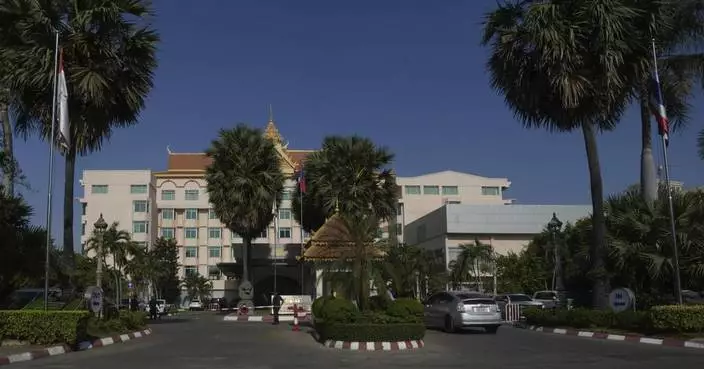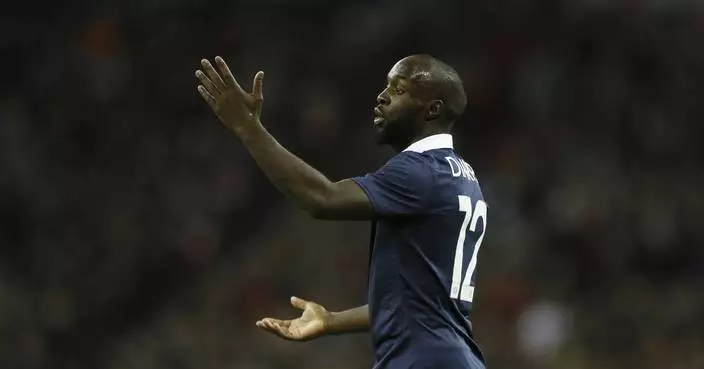Like white smoke from the Vatican announcing a new pope, the signal from Britain's Cabinet table says: We have a decision.
After a year and a half of negotiating with the European Union — and fighting with itself — the U.K. government on Wednesday backed a deal to allow Britain's orderly exit from the bloc, and paint the outlines of future relations.
Prime Minister Theresa May's fractious Conservative government agreed on a deal that solves the key outstanding issue — how to ensure a frictionless border between the U.K.'s Northern Ireland and EU member Ireland after Brexit. The "backstop" plan involves keeping the U.K. in a customs union with the EU until a permanent trade treaty is worked out.
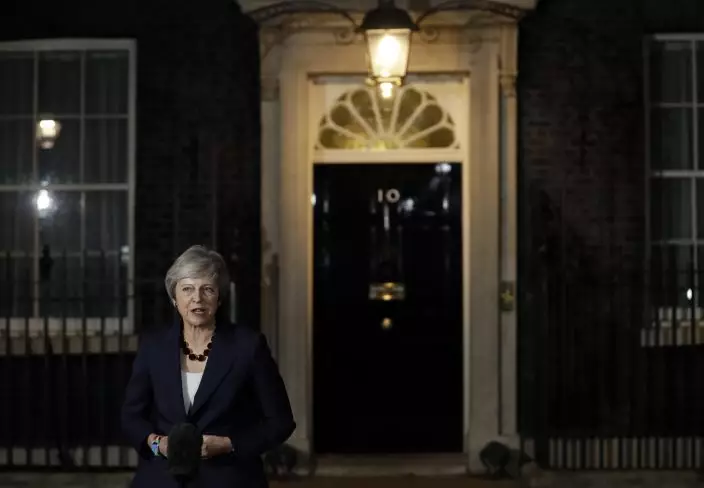
Britain's Prime Minister Theresa May delivers a speech outside 10 Downing Street in London, Wednesday, Nov. 14, 2018. British Prime Minister Theresa May says Cabinet agrees draft Brexit deal with European Union after 'impassioned' debate. (AP PhotoMatt Dunham)
It's a breakthrough, but the path to Brexit day — just over four months away on March 29 — remains rocky.
Here's a look at what is likely to happen next:
BEELINE TO BRUSSELS
May is due to update Parliament on Thursday on what has been agreed, while Brexit Secretary Dominic Raab will likely head to Brussels to meet with chief EU negotiator Michel Barnier.
Barnier declared there has been "decisive progress" toward a deal — the phrase that allows EU leaders to call a special summit to approve the deal. They have penciled in a meeting for Nov. 25.
The deal consists of two parts: a legally binding withdrawal agreement — which includes the border backstop — and a looser framework for future relations. The two sides have given themselves a transition period until the end of 2020 to work out the details of future trade ties.
PERIL IN PARLIAMENT
Once the EU has signed off on it, the deal also must be approved by the European and British parliaments
May hopes to get it passed by U.K. lawmakers before Christmas. Business groups warn that most U.K. companies will implement Brexit contingency plans — cutting jobs, stockpiling goods, relocating production — if there isn't clarity by then about the terms of Brexit.
But she faces an uphill battle. May's Conservative Party doesn't hold a majority of seats in the House of Commons, and relies on 10 lawmakers from Northern Ireland's Democratic Unionist Party to win votes. But the DUP says it will reject any deal that treats Northern Ireland differently to the rest of the U.K.
Several dozen pro-Brexit Conservatives have vowed to oppose any arrangement that keeps Britain in a customs union, and tied to EU trade rules, indefinitely.
The main opposition Labour Party also says it will oppose any deal that doesn't offer the same benefits Britain currently has as a member of the EU's single market and customs union.
May is calculating that, faced with the prospect of a chaotic "no-deal" exit — complete with financial turmoil, gridlock at U.K. ports and shortages of essential goods — most Conservatives and some opposition lawmakers will crumble and support the deal.
UNCHARTED TERRITORY
If Parliament rejects the deal, Britain enters unknown territory.
Lawmakers could try to send the government back to the negotiating table with the EU, though there's no simple mechanism to make that happen. They could defeat the government in a no-confidence vote in an attempt to trigger a national election.
Lawmakers could even vote for a new referendum on EU membership, though it seems unlikely there would be time to hold one before the U.K.'s scheduled departure date. The U.K. will cease to be an EU member on March 29 — deal or no deal.
Iain Begg, a professor at the London School of Economics' European Institute, said rejection of a deal would trigger a major political crisis because Britain's patchwork constitution offers no "prescribed way out of that dilemma."
He said in that case, "we really are into a period of great uncertainty about what happens next. I think nobody can know how it would unfold."
Follow Jill Lawless on Twitter at http://Twitter.com/JillLawless
BEIRUT (AP) — The European Union announced Thursday an aid package for Lebanon of 1 billion euros — about $1.06 billion — much of which will go to boost border control to halt the flow of asylum seekers and migrants from the small, crisis-wracked country across the Mediterranean Sea to Cyprus and Italy.
The deal follows other EU aid packages for countries such as Egypt, Tunisia and Mauritania to fortify their borders. It comes against a backdrop of increasing hostility toward Syrian refugees in Lebanon and a major surge in irregular migration of Syrian refugees from Lebanon to Cyprus.
European Union Commission President Ursula von der Leyen said during a Beirut visit with Cypriot President Nikos Christodoulides that the aid distribution will start this year and last till 2027.
The bulk of the aid — 736 million euros — would go to support Syrian refugees “and other vulnerable groups” in Lebanon, while 200 million euros are meant to bolster Lebanese security services in enforcing border and migration control, according to figures provided by the Cypriot government.
An unspecified amount would go to Lebanese fishermen, to discourage them from selling their boats to smugglers.
Von der Leyen said the EU will also work on a “more structured approach to voluntary return" of Syrian refugees "in close cooperation with” the U.N. refugee agency. The bloc will continue to maintain “legal pathways” for resettlement of refugees in Europe, she said.
Lebanon's caretaker Prime Minister Najib Mikati praised the package, saying that “Lebanon’s security is security for European countries and vice versa,” and that an escalation of the crisis ”will not be limited to Lebanon but will extend to Europe."
Lebanon, which has been in the throes of a severe financial crisis since 2019, hosts nearly 780,000 registered Syrian refugees and hundreds of thousands more who are unregistered, the world's highest refugee population per capita.
Lebanese political officials have for years urged the international community to resettle the refugees in other countries or assist their return to Syria — voluntarily or not. Lebanese security forces have stepped up deportations of Syrians over the past year.
Tensions further flared after an official with the Christian nationalist Lebanese Forces party, Pascal Suleiman, was killed last month in what military officials said was a botched carjacking by a Syrian gang. The incident prompted outbreaks of anti-Syrian violence by vigilante groups.
Meanwhile, Cypriot authorities complain the island nation has been overwhelmed by irregular migration of Syrian asylum seekers, many of them coming on boats from Lebanon.
The UNHCR in Lebanon said it had verified 59 “actual or attempted” departures by boats carrying a total of 3,191 passengers from Lebanon between January and mid-April, compared to three documented boat movements carrying 54 passengers in the same period last year. Usually, few boats attempt the much more dangerous crossing in the winter. In all of 2023, UNHCR recorded 65 boat departures carrying 3,927 passengers.
Cyprus has taken a new approach to halting the flow of migrants. Last month, it suspended processing of Syrian asylum applications, and human rights groups accused the Cypriot coast guard of forcibly turning back five boats carrying about 500 asylum seekers coming from Lebanon. Cypriot officials have denied this.
Bassel al-Shayoukh, a Syrian refugee from Idlib living in Lebanon since 2014, said his brother and several cousins and nephews were on one of the boats turned back. Now he wants to make the journey himself.
“In the beginning I thought that in a year or two the war would be over in Syria,” he said, but it dragged on, while in Lebanon “every year ... the situation began to get worse.”
Shayoukh said he fears being beaten by vigilantes or deported to Syria after Lebanese authorities declined to renew his residency permit.
His 17-year-old nephew, who declined to give his name fearing for his safety, said the Cypriot coast guard started making waves to push the boat he was on away. “I was terrified... I don’t know how to swim,” he said. “I thought we were going to die.”
The people on the boats “stayed three days without food or water” before turning back to Lebanon, the teen added.
Back in Lebanon, they were detained by the army; those registered with UNHCR were released and the others deported.
Mohammed Sablouh, a Lebanese human rights lawyer who works on refugee and migrant cases, says Lebanese authorities are deliberately “turning a blind eye" to the surge in migration to "pressure the international community.”
The Lebanese army did not respond to a request for comment on their measures to combat smuggling.
Thursday's aid announcement comes ahead of the annual fundraising conference for the Syrian crisis in Brussels later this month. After 13 years of civil war, donor fatigue has set in while the world’s attention is occupied by the humanitarian fallout of more recent conflicts in Ukraine and Gaza.
The Cypriot president said Thursday was a “historic day” and called for European officials to go farther and declare some areas of Syria safe for return.
“The current situation is not sustainable for Lebanon. It is not sustainable for Cyprus, it is not sustainable for the European Union,” Christodoulides said.
But not all Lebanese officials are convinced the European aid would solve the problem.
Lebanese Forces party head Samir Geagea told The Associated Press earlier this week that European authorities are mainly concerned “that the refugees don’t go to Europe."
"For us the problem is that we cannot have our country drowning in illegal Syrian refugees,” Geagea said, urging for Syrians to be sent back to either government or opposition-held areas of the neighboring country.
But Shayoukh says he has nowhere to go.
The Damascus government wants him for opposing Syrian President Bashar Assad, he said, while the Islamist group that now controls his hometown behaves "the same way as the regime’s intelligence services” in crushing dissidents.
Associated Press writer Menelaos Hadjicostis in Nicosia, Cyprus, contributed to this report.
Follow AP’s global migration coverage at: https://apnews.com/hub/migration

Lebanese caretaker Prime Minister Najib Mikati, center, speaks during his meeting with Cyprus' President Nikos Christodoulides, left, and President of the European Commission Ursula von der Leyen at the government palace in Beirut, Lebanon, Thursday, May 2, 2024. (AP Photo/Hassan Ammar)
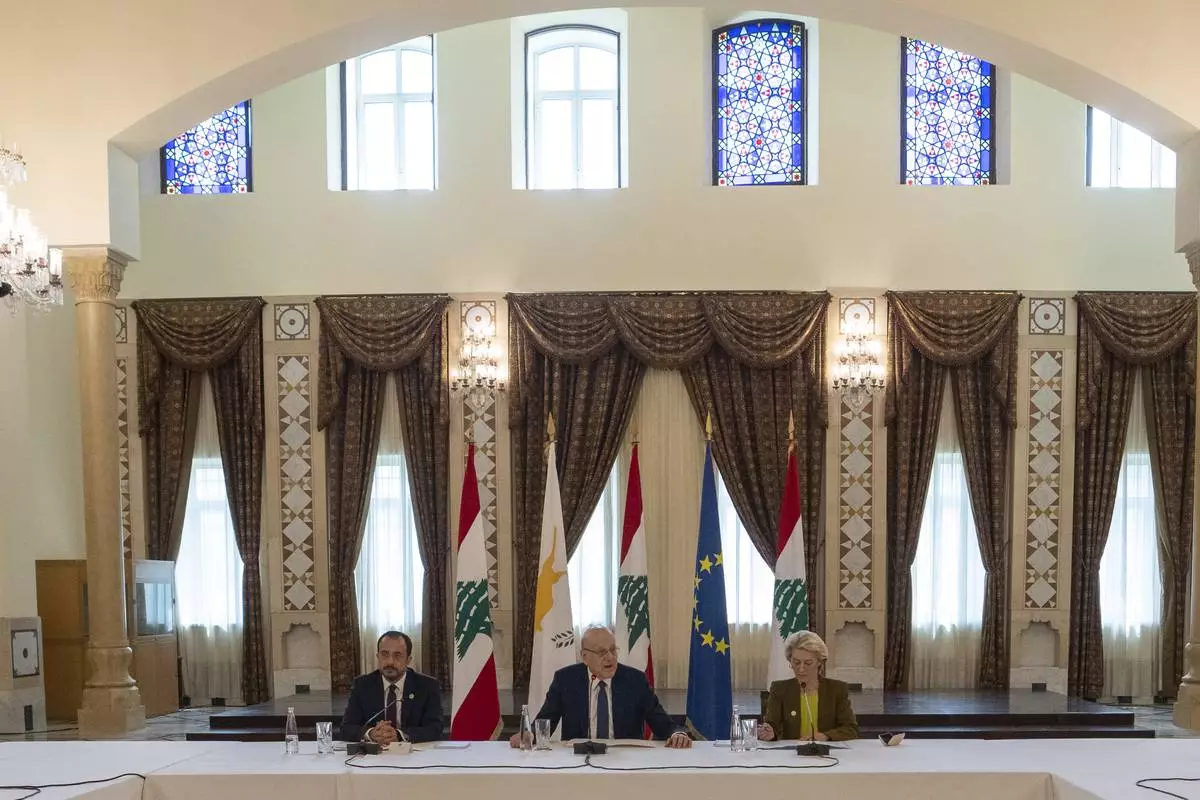
Lebanese caretaker Prime Minister Najib Mikati, center, speaks during his meeting with Cyprus' President Nikos Christodoulides, left, and President of the European Commission Ursula von der Leyen at the government palace in Beirut, Lebanon, Thursday, May 2, 2024. (AP Photo/Hassan Ammar)

Lebanese caretaker Prime Minister Najib Mikati, center, welcomes Cyprus' president Nikos Christodoulides, left, and President of the European Commission Ursula von der Leyen before their meeting at the government palace in Beirut, Lebanon, Thursday, May 2, 2024. (AP Photo/Hassan Ammar)
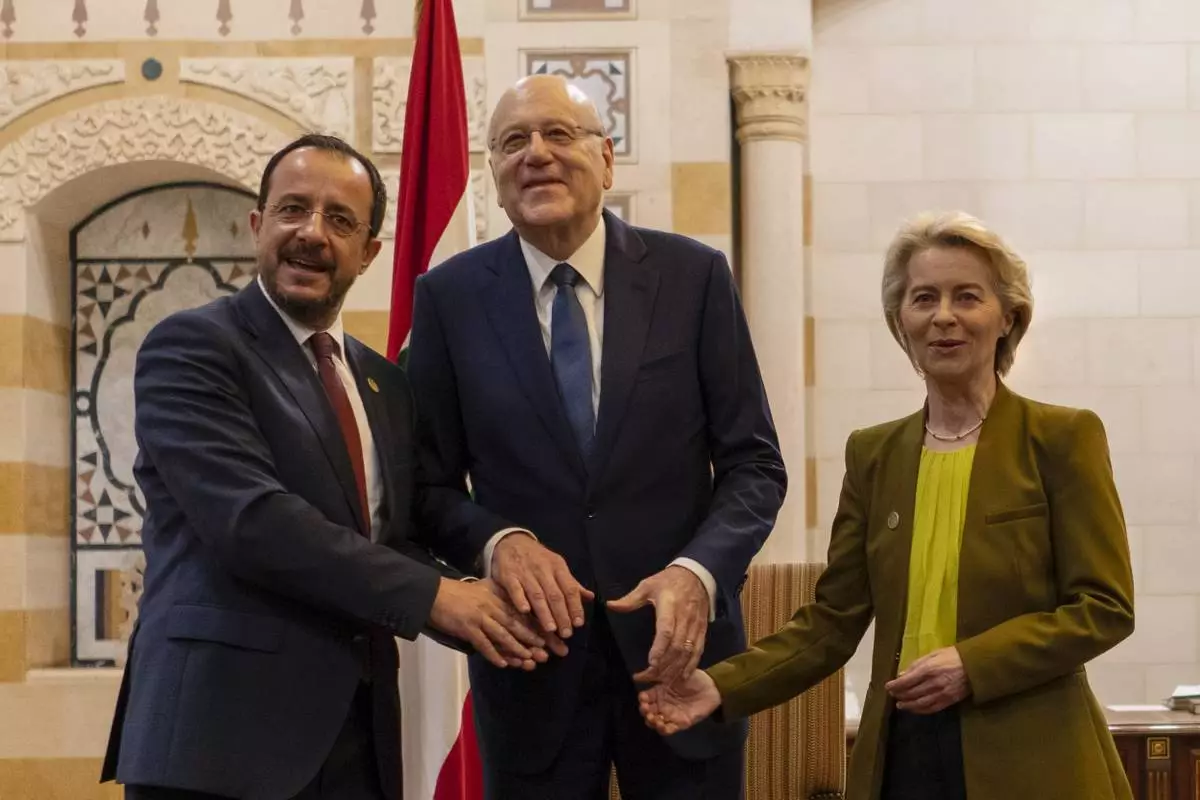
Lebanese caretaker Prime Minister Najib Mikati, center, Cyprus' President Nikos Christodoulides, left, and President of the European Commission Ursula von der Leyen pose for photograph at the government palace in Beirut, Lebanon, Thursday, May 2, 2024. (AP Photo/Hassan Ammar)
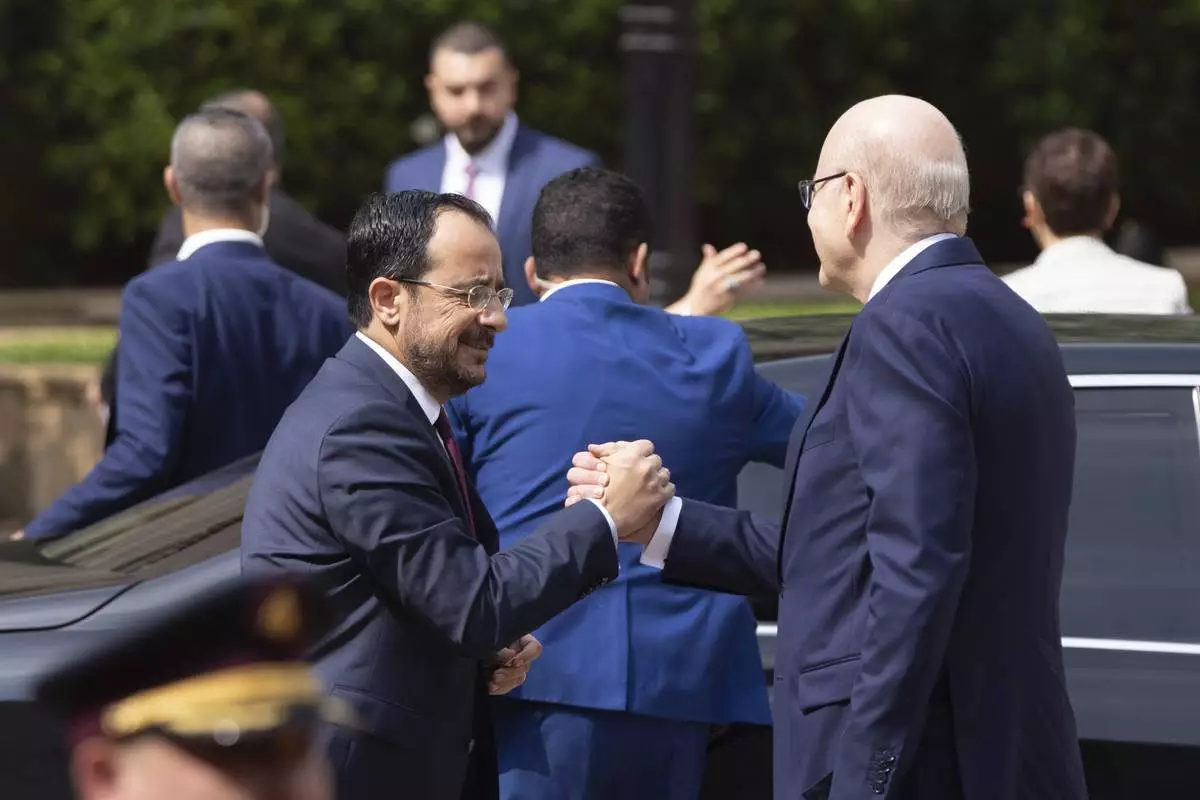
Lebanese caretaker Prime Minister Najib Mikati, right, welcomes Cyprus' president Nikos Christodoulides before their meeting at the government palace in Beirut, Lebanon, Thursday, May 2, 2024. (AP Photo/Hassan Ammar)

Cyprus' President Nikos Christodoulides, left, and President of the European Commission Ursula von der Leyen, center, review an honor guard upon their arrival to meet with the Lebanese Speaker Nabih Berri, in Beirut, Thursday, May 2, 2024. (AP Photo/Hussein Malla)

Lebanese caretaker Prime Minister Najib Mikati, center, speaks during his meeting with Cyprus' President Nikos Christodoulides, left, and President of the European Commission Ursula von der Leyen at the government palace in Beirut, Lebanon, Thursday, May 2, 2024. (AP Photo/Hassan Ammar)
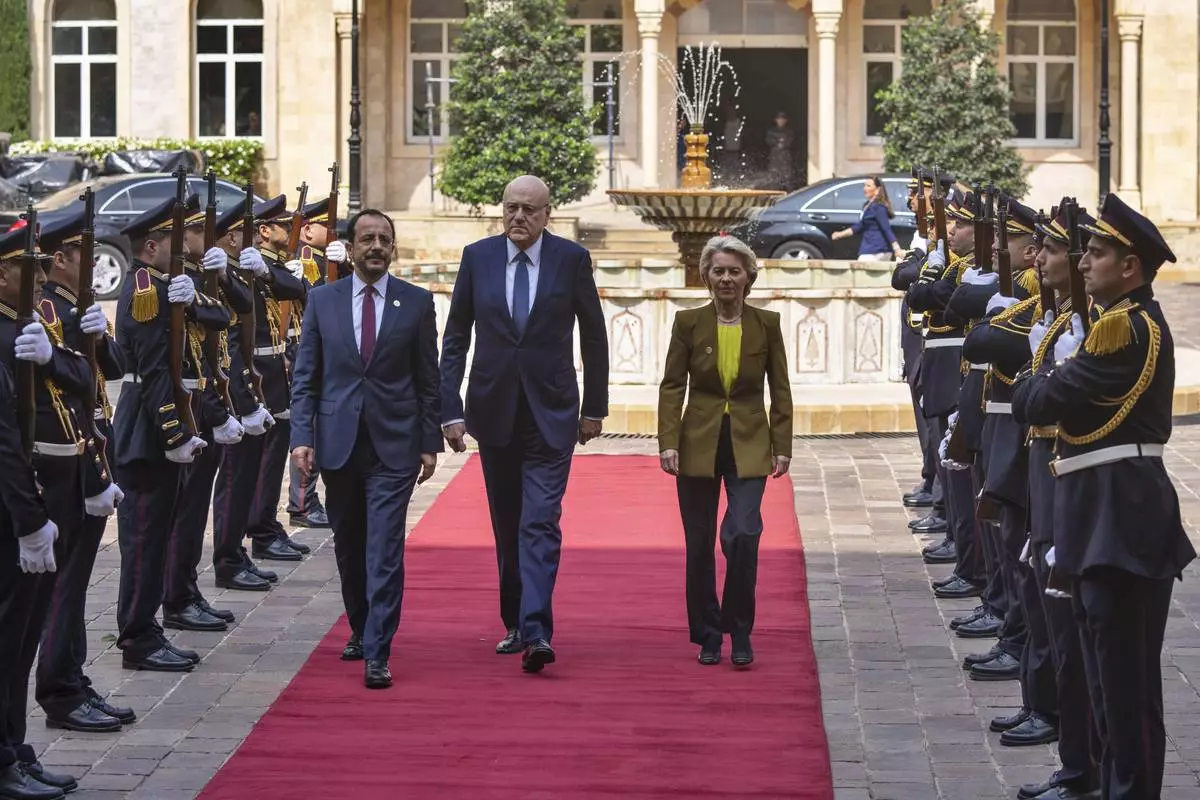
Lebanese caretaker Prime Minister Najib Mikati, center, welcomes Cyprus' President Nikos Christodoulides, left, and President of the European Commission Ursula von der Leyen at the government palace in Beirut, Lebanon, Thursday, May 2, 2024. (AP Photo/Hassan Ammar)













